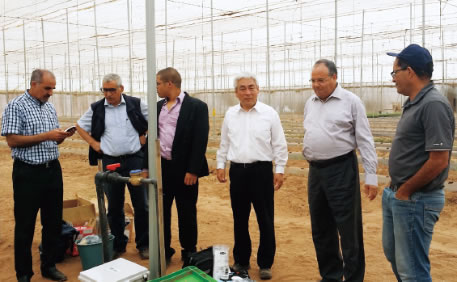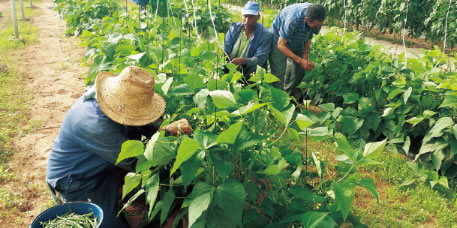Master Techniques from Japan to the World 1
Introducing Sustainable Water
Saving Agriculture Technology
in Arid Areas of Morocco
– Unique technology helping to save water and improve soil
quality in arid regions

Mr. Yoshiaki Takeuchi (center) works on the Porous Alpha water-saving agriculture technology, with members of the Souss Massa Regional Agricultural Development Corporation in Morocco. (Photo: Tottori Resource Recycling, Inc.)
Situated in the northwest corner of the African continent, Morocco borders the Mediterranean Sea to the north and the Atlantic Ocean to the west. Agriculture is a key industry for Morocco, accounting for 13% of GDP, 11% of exports, and 25% of the workforce (approx. 3 million people). However, there are many arid areas in the country troubled by chronic water shortages and harvests can fall by 50% in times of drought. Given that rainfall is expected to decrease due to the effects of climate change, the cost of securing a sufficient volume of water for agricultural purposes continue to rise each year, making sustainable use of water resources a major challenge.
The Souss-Massa region in central Morocco is a major vegetable producing region. Although, drip irrigation, which uses small volumes of water effectively, is prevalent in this region, water shortages still remain an issue. It is in the face of this situation that the hopes for the water saving agriculture of the Souss-Massa region are resting on Porous Alpha®. Porous Alpha developed by Tottori Resource Recycling Inc. is a porous foamed glass material made from waste glass and sea shells (calcium carbonate). At the initial stages of the development, the company anticipated that the material could be used as a lightweight filling material for civil engineering works or as crime prevention gravel.1 However, in joint research with the Arid Land Research Center of Tottori University, it became apparent that the material had excellent properties as a soil conditioning material. If mixed with soil, water accumulates in the many tiny holes in the material, thus helping to improve soil water retention capacity. Moreover, Porous Alpha with its low environmental impact was registered in the Environmental Technology Database of the United Nations Industrial Development Organization (UNIDO) in 2010 as water saving agriculture technology for arid areas.

Green beans are harvested as part of a trial cultivation by the Regional Agricultural Development Office of the Souss Massa. (Photo: Tottori Resource Recycling, Inc.)
Tottori Resource Recycling Inc. first became aware of the water issues, facing the agricultural industry in Morocco in 2008. When the company made a presentation to an academic meeting in Morocco about its established water saving agricultural technology using Porous Alpha, Moroccan government agencies approached the company about launching a Verification test project. The project did not materialize at that time, as an agreement was not reached between the Government and the company on the role played and costs shared. Meanwhile, the company conducted a verification test project on Porous Alpha in Senegal using JICA’s Feasibility Survey with the Private Sector for introducing Japanese Technologies. When the project in Senegal produced good results, the company started looking for other countries with large scale agricultural industries where the technology could be used, and recalled their past exchange with Morocco. It was decided that, from June 2015 a two-and-a-half year Verification Survey2 for disseminating Japanese technologies would be conducted, under JICA’s support for Japanese Small and Medium-sized Enterprises (SMEs) Overseas Business Development3 using ODA.
Tomatoes and green beans were planted in the first experiment, conducted in a research facility of the Regional Agricultural Development Office of the Souss-Massa from September 2015 to April 2016. The result was 50% reduction in water used, and 28% increase in tomatoes yielded and 22% increase in green beans yielded. The result demonstrated the high effectiveness of Porous Alpha, in realizing water saving, increasing yields, and improving soil and crop safety.
“I think the field manager of the Regional Agricultural Development Office could see for himself that the crops planted in the field with Porous Alpha demonstrated better growth than the one without. I was delighted to see him promoting Porous Alpha to the visitors to an agricultural exhibition held in Morocco in December 2015. I realized and appreciated that he trusted our product” says Mr. Yoshiaki Takeuchi, President of Tottori Resource Recycling Inc., looking back.
On the basis of these results, Porous Alpha was experimentally introduced to large-scale farms from August 2016. Mr. Takeuchi says “The experiment will cover an area of over two hectares whereas the project at the Regional Agricultural Department Office covered 0.06 hectares. Also, farming methods and field condition differ slightly from producer to producer. So I await the result with mix feeling of anticipation and anxiety.”
In August 2016 the company participated in an exhibition held on the occasion of the Sixth Tokyo International Conference on African Development (TICAD VI) in Nairobi, Kenya, introducing its water saving agricultural technology using Porous Alpha. The technology drew considerable attention from representatives of African countries with vast arid regions.
Mr. Takeuchi notes, “In the arid regions of Morocco demand for water outstrips that of supply and underground water levels are dropping each year. If the introduction of Porous Alpha could contribute to halving the amount of water used, it could halt the decreasing of the underground water level and could enable people to engage in agriculture activities without worrying about less rainfall and drought caused by climate change.”
The company plans to expand the use of Porous Alpha to other crops, such as fruit trees, and also to set up local production and sales systems.
*1 “Crime prevention gravel” is designed to make a loud noise when walked over, alerting people to the footsteps of intruders.
*2 A survey to verify ways to enhance a product and technology’s compatibility with a developing country and thereby disseminate the product and technology, based on a proposal from Japanese SME.
*3 Projects aiming to achieve both the development of developing countries and the activation of the Japanese economy by utilizing Japanese SMEs’ excellent products and technologies through ODA.
Next Page >>
Main Text | Statistics and Reference Materials | Stories from the Field | Master Techniques from Japan to the World | ODA Topics
